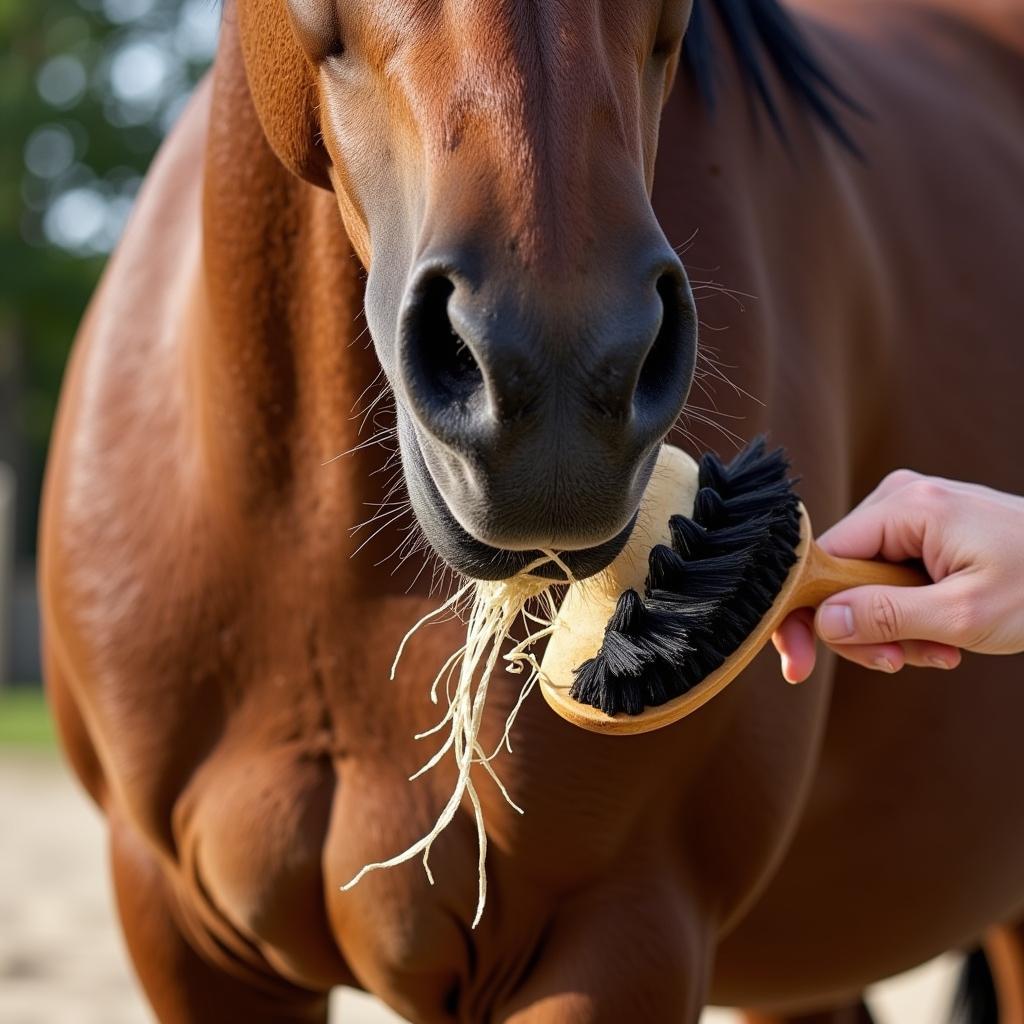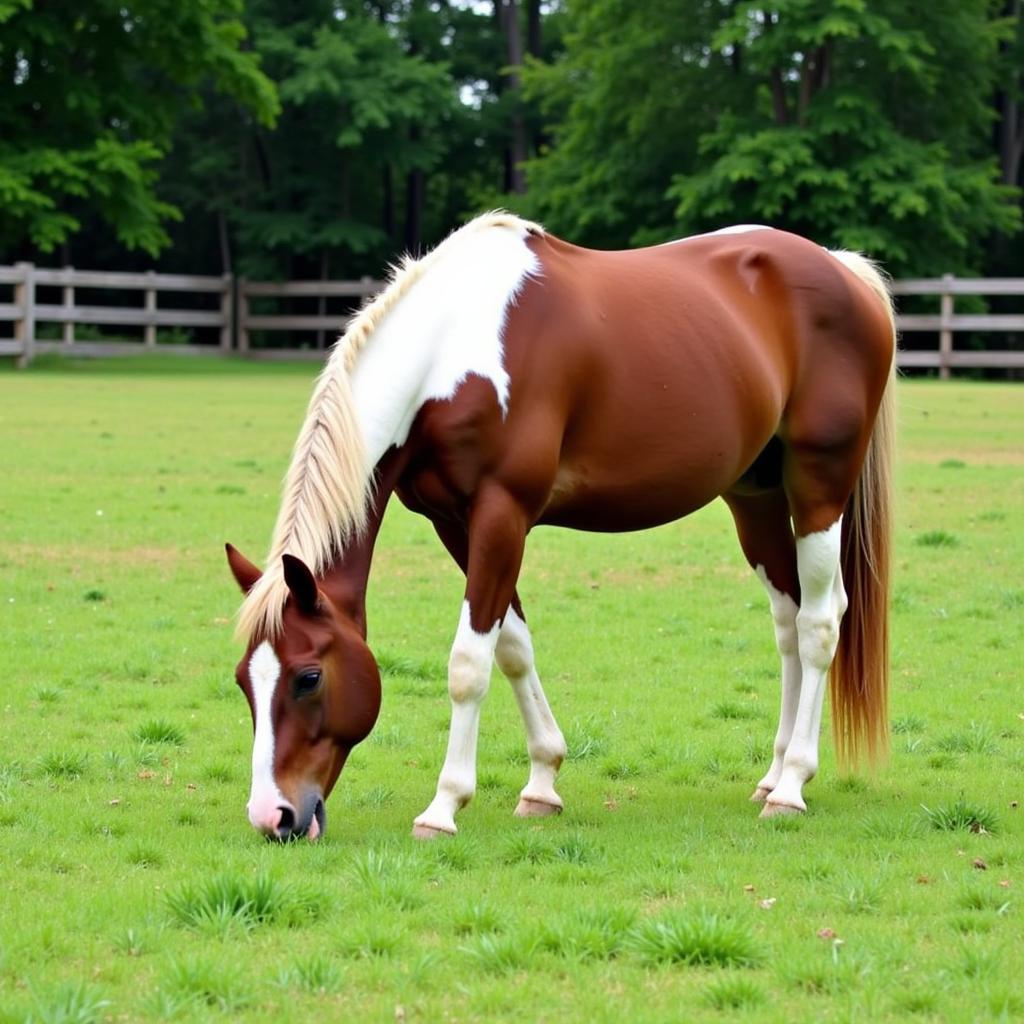Horses are majestic creatures, but even they can fall victim to pesky parasites. While fleas are more commonly associated with our canine and feline companions, many horse owners often wonder, “Can horses get fleas?” The answer is a bit more nuanced than a simple yes or no.
Do Fleas Really Bite Horses?
While it’s technically possible for fleas to land on a horse and even take a bite, fleas don’t typically infest horses the way they do other animals. Fleas have specific host preferences, and horses are not their ideal environment. Their body temperature, hair type, and grooming habits make horses less hospitable to these bloodsucking insects.
 Horse Being Groomed with a Brush
Horse Being Groomed with a Brush
What Are the Common Culprits Behind Horse Skin Irritations?
If you notice your horse excessively itching, scratching, or showing signs of skin irritation, fleas are likely not the culprit. Several other parasites are more common in horses and can cause similar discomfort:
- Ticks: These bloodsucking parasites are notorious for transmitting diseases and can cause significant irritation to horses.
- Lice: These tiny insects live on the horse’s skin and hair, causing intense itching and hair loss.
- Mites: Different types of mites can infest horses, leading to various skin conditions like mange.
- Flies: Beyond being a nuisance, flies can transmit diseases and cause painful bites.
How Can I Tell if My Horse Has Parasites?
Vigilance is key when it comes to protecting your horse from parasites. Regularly inspect your horse’s coat, especially around the mane, tail, and underbelly, for any signs of:
- Tiny, moving insects
- Red, irritated skin
- Scabs or sores
- Hair loss
- Excessive rubbing or scratching
- Dull or rough coat
What Should I Do if I Suspect My Horse Has Parasites?
If you notice any of the above signs, it’s crucial to contact your veterinarian immediately. They can accurately diagnose the type of parasite and recommend the most effective treatment plan.
How Can I Prevent Parasites in My Horse?
Prevention is always better than cure. Here are some steps you can take to keep your horse parasite-free:
- Maintain a clean and dry environment: Regularly clean stalls, paddocks, and water troughs to discourage parasite breeding.
- Grooming: Regular brushing removes loose hair and dirt, making it less inviting for parasites.
- Parasite control products: Consult your veterinarian for suitable deworming medications and topical insecticides for your horse’s specific needs.
- Pasture management: Rotate pastures regularly to break the parasite life cycle.
 Horse Grazing in a Lush Green Pasture
Horse Grazing in a Lush Green Pasture
Can I Use Flea Products Meant for Dogs or Cats on My Horse?
Never use flea or tick products intended for dogs or cats on your horse. These products are formulated differently and can be extremely toxic to horses, even in small amounts.
Keeping Your Horse Happy and Healthy
While the thought of fleas on your horse might seem surprising, it’s important to remember that other parasites pose a more significant threat. Regular observation, a clean environment, and a proactive approach to parasite control are the best ways to ensure your equine companion stays happy, healthy, and parasite-free.
Remember, if you have any concerns about your horse’s health or suspect a parasite infestation, always consult with a qualified veterinarian.
Frequently Asked Questions
- Can I use fly spray on my horse to prevent fleas? While fly spray can deter some fleas, it’s not a guaranteed solution. Consult your vet for appropriate flea control methods.
- Are horses allergic to flea bites? While rare, some horses might have an allergic reaction to flea bites, just like humans.
Need More Help?
Do you have more questions about keeping your horse healthy and parasite-free? Contact Justus Horses USA today! Our team of experts is ready to provide personalized advice and support for all your equine needs. Call us at 0772127271, email us at [email protected], or visit our facility at QGM2+WX2, Vị Trung, Vị Thuỷ, Hậu Giang, Việt Nam. We’re available 24/7 to assist you!